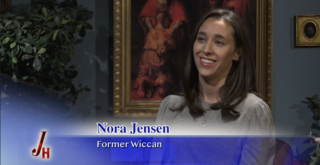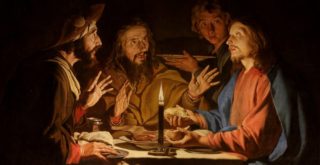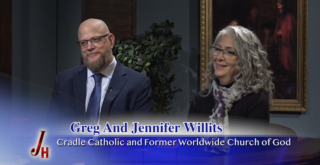
The journey to the Catholic Church is long and arduous for many people. Often the path is strewn with almost insurmountable obstacles, and many doubts, including self-doubt, seem to lie on the way. Even after entering the Church, which is an occasion of great joy, some converts find their new environment full of unexpected challenges. Yet, one thing characterizes all who find their way to the fullness of the faith in the Church: trust. Without trust they would not have begun their journey nor brought it to completion in being united finally with the Church.
There is an old Catholic saying with several variations which expresses the essence of trust in God’s goodness. Commit the past to God’s mercy, the present to His love, and the future to His providence. In my sixteen years as a Catholic I have come to understand these words with an increasing appreciation of their wisdom and truth. Often wise priests console their penitents in the confessional to commit the past to God’s mercy, knowing that we cannot change what has already taken place. When we muse over our past sins or failures, such wise confessors encourage us to let go of our past and place it into the merciful hands of God.
Committing the past to God’s mercy is not only to give Him our sins and failures but also to give Him our successes as well. Many clergy converts can remember times of great blessings in their former ministries, occasions when God used them mightily in helping others to know Christ and His salvation. They fondly recall how people responded to their biblical teaching, counsel, or direction with a heart fully open to God. It is easy to form an identity around the things that we have done or accomplished. That in fact is how most people form their personal identities in our culture. But basing our identity on our accomplishments is not the way of Christ. If it were, Paul would not have said, “Whatever was gain to me I now consider loss for the sake of Christ” (Phil 3:7). Christ’s way is for His disciples to form an identity through relationship rather than through accomplishment. Becoming Catholic and becoming comfortable with being Catholic is a long process of reshaping our identity based on a relationship with Christ by participation in His Church. Committing the past to God’s mercy involves thanking Him for His blessings and giving those successes back to Him. As we relinquish our successes, we come to love God more in the present.
Committing the present to God’s love means that we are willing for God to show us how wide and how deep is His love for us. This four letter word, of course, suffers from overuse in contemporary America, but that fact does not lessen its true meaning or the Divine Reality behind it. The Scriptures speak over and over again of God’s love as covenant faithfulness or chesed (). In the Psalms and the Prophets God constantly reminds His people of His loving goodness in contrast to their apostasy. Like Israel, our past can cause us to doubt God’s love in the present both in our failures and in our successes. But if we know that God’s loving faithfulness never changes, we can commit our present circumstances to Him with the expectation that we will find the traces of His love marking our path as we move forward. God’s love for us is like an ever flowing stream coming down from above.
Committing our present to God means believing that God is enough to make us happy. Everyone desires happiness, longs for it, needs it. Everyone senses that happiness is the goal of life. But few know how to find it. One reason is that we all too often think that the right set of circumstances will make us happy. The right job, the right house, the right spouse. And so our constant temptation is to substitute things or people for the one thing that can truly make us happy. But a true faith, a sustained and enduring faith, knows that God alone can make us happy. The knowledge that God is the true source of our happiness beckons us to place our trust in Him.
The great spiritual writers throughout the history of the Church emphasize that happiness in God carries with it a process of detachment from lesser goods. The lesser things, good in and of themselves, are not evil but they can become obstacles to a more profound trust in God if we allow them to substitute for God as the center and source of our contentment. Through consciously detaching ourselves from lesser goods we open up our hearts to a greater good of God’s indwelling presence. When we allow God’s love to dwell within our hearts with increasing frequency and depth, we gradually come to see that He is the source and ground of our happiness. So, detachment from lesser goods and attachment to the Ultimate Good requires conscious effort through prayer, meditation, and participation in the sacraments of the Church.
The increasing perception of God’s love in the present causes us to place greater trust in God’s providence for our future. We come to know that whatever our future brings, God foresaw it and is showing us His love through it. The word providence derives from a Latin verb providere “to see beforehand.” When we are beseeching God in the present, He already sees our future because it is present to Him for whom all things are like the present. To Him there is no past, present, or future. It is all one Now! Providence also translates a Greek word beloved by Christian writers. That word pronoia (προνοια) derives from a verb pronoein (προνοειν) meaning “to mind ahead of time.” While we are blinded by our present circumstances, God is already minding the store, as it were, of our future. Like a good shopkeeper, He is arranging the furniture and goods inside the store to make us more and more to be saints.
Consider the life of Mary, Jesus’s mother. While humbly accepting God’s plan for her to bear the Eternal Word (Logos), she still could not see all that her vocation as the Mother of God entailed. She could not see herself standing by the cross of Jesus (cf. Jn 19:25-27). Yet God was preparing her all along to face the ignominious death of her Son. God also prepares us to bear future trials by strengthening our faith through lesser trials of the present so that we may become triumphant when the great trials arise.
Most of us who were Protestant clergy never foresaw ourselves as Catholics when we began our ministries, but it was already in God’s mind and heart. He was guiding our every step in both success and failure to bring us to the point where we are now. Even if we were unaware of or inattentive to God’s providence, it was there all the same. God was minding the store of our lives to reveal our future step by step. Even now, within the walls of Holy Mother Church, we still often do not know where our future is leading in practical service but we can be sure that He is preparing our steps. And our way of stepping into that future is really the same as when we were in Protestant ministry: trust. We trust best when we commit ourselves daily to His love, that is, being loved by Him and to returning His love for us.










